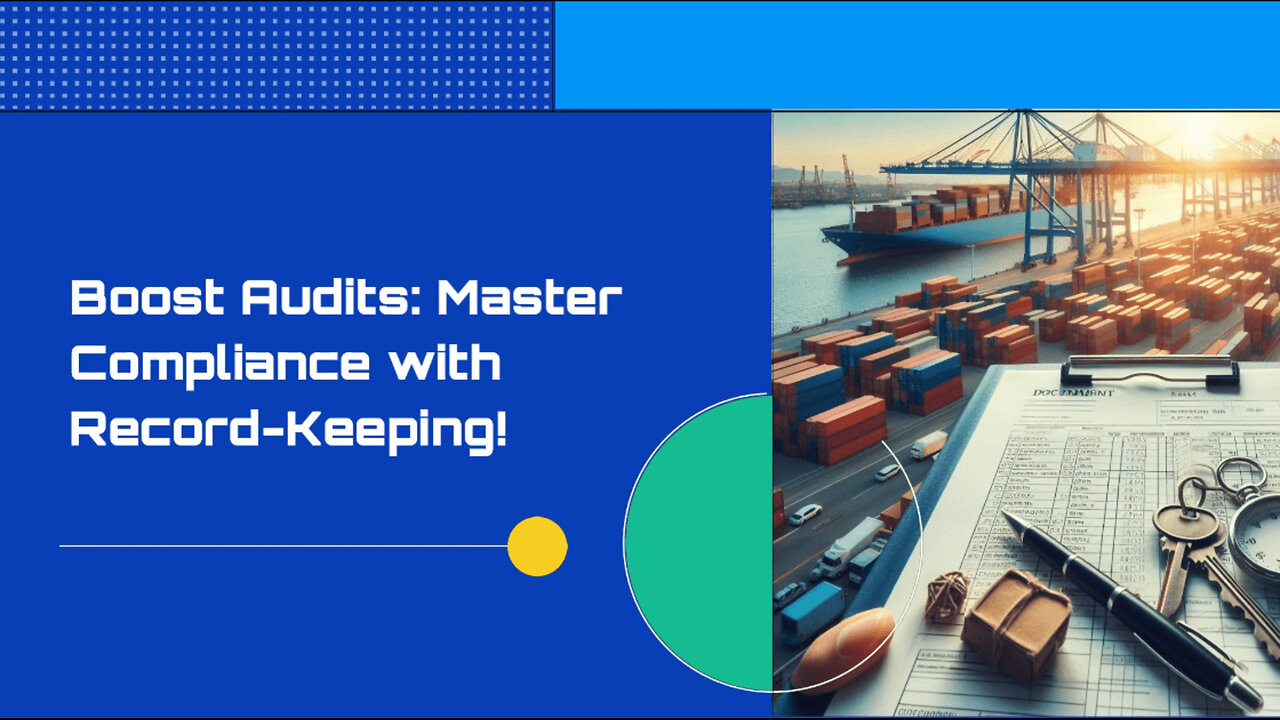Premium Only Content

Mastering Record-Keeping: The Key to Customs Compliance and Efficient Audits
ISF Filer || isf@isffiler.com || 858-280-9374 || www.isffiler.com
Proper record-keeping is an essential aspect of customs compliance for importers and customs brokers. It serves as a valuable tool to demonstrate adherence to regulations and facilitate the efficient clearance of goods through customs. This includes maintaining customs bond documents, which provide financial guarantees for payment of duties, taxes, and penalties. Additionally, accurate and up-to-date Importer Security Filing (ISF) records help demonstrate compliance with security requirements. The advent of digital technology has enabled importers and customs brokers to utilize efficient and secure document management systems, simplifying record organization and retrieval while enhancing compliance. Comprehensive and well-documented records can save importers and customs brokers from penalties, fines, or clearance delays during external customs audits. Additionally, conducting regular internal audits allows for proactive identification and rectification of any gaps or inconsistencies in record-keeping processes. Best practices for proper record-keeping include establishing clear policies, documenting all relevant transactions, maintaining records for the specified period, and providing ongoing customs compliance training for employees. By prioritizing proper record-keeping, importers and customs brokers demonstrate their commitment to regulatory compliance and support smooth audits.
#usimportbond #isfcustomsbroker #uscustomsclearing #isfentry
Video Disclaimer Here: This video is intended for educational purposes and has no affiliation with US government entities.
00:24 - Proper record-keeping is crucial for customs compliance
00:39 - Customs bond documents are essential for importers
00:57 - Importer Security Filing (ISF) manifests must be accurate
01:16 - Digital document management systems simplify record-keeping processes
01:58 - Regular internal audits and training on customs compliance
-
 9:51
9:51
Alabama Arsenal
11 hours agoRXD30Ti
80 -
 20:06
20:06
The Why Files
4 days agoSTRIPPED: When Earth's Shield Fails the Dead Will Rise | The Plasma Apocalypse
185K116 -
 12:26
12:26
EvenOut
13 hours ago $11.64 earnedWe Got Cosmestic Surgery That Went Wrong! Twin Switch-Up!
51.9K11 -
 1:15:07
1:15:07
Ami's House
19 hours ago $9.57 earnedWhat an ACTUAL Military Expert Thinks of the War in Gaza – Nick Freitas | FULL EP
30.6K22 -
 2:54:02
2:54:02
TimcastIRL
11 hours agoLiberal Media CAUGHT In BOGUS LEAK, Trump DID NOT Fire Mike Waltz, HE PROMOTED HIM | Timcast IRL
237K134 -
 9:05:24
9:05:24
MyronGainesX
18 hours ago $28.08 earnedSam Seder Embarrasses Ethan Klein, The Truth On MLK's Murder, Panel Debate w/ Anton Daniels
86.2K31 -
 1:09:38
1:09:38
Man in America
14 hours agoEXPOSED: How Militaries Worldwide Are Engineering DEPOPULATION w/ Todd Callender
81.4K53 -
 8:00:02
8:00:02
SpartakusLIVE
13 hours agoNEW Update, NEW Weapons, NEW META?!? || Quads in VERDANSK
38.6K -
 5:14:28
5:14:28
Jokeuhl Gaming and Chat
10 hours agoEmpyrion - Galactic Survival Long Range Jump Aquired
50.1K1 -
 4:42:30
4:42:30
Right Side Broadcasting Network
1 day agoLIVE REPLAY: President Trump Gives Commencement Address at University of Alabama - 5/1/25
175K23